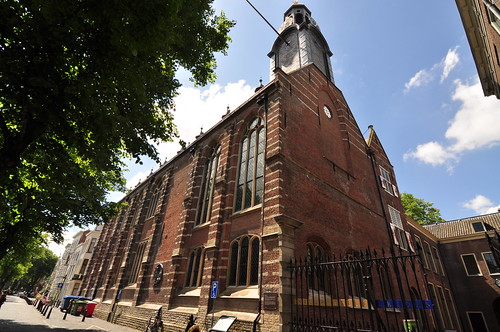Birth and early days
Hadrian Saravia was born 1530/31 in Hesden, Artois, Belgium. He had a Spanish father and a Flemish mother. We know little of his early life. He was trained for a clerical career in the Low Countries (1). His training specialised broadly in languages. Saravia was responsible for drawing up the Walloon Confession and he founded the Walloon church in Brussels.
Approaching maturity
In 1566 Saravia became minister at Ghent, and experienced conflict there with some of his colleagues. He ‘escaped’ to England. There the Privy Council sent him to Guernsey in the Channel Islands to found Elisabeth College, and to pastor a church there.
Elisabeth CollegeIn 1577 he was recalled to Belgium from Guernsey. In 1582 he became Prof. of Divinity at Leiden, aged 51/52, and awarded a D.D. Leiden University is well-known for its long-held standard of superlative scholarship:
The presence within half a century of the date of its foundation of [various famous] scholars . . at once raised Leiden university to the highest European fame, a position which the learning and reputation of . . others enabled it to maintain,University of Leiden
At the same time Saravia was appointed preacher of the French Reformed Church in Leiden.
Advocate of the high church position
In 1588 Saravia moved to England to teach at Southampton Grammar school In 1590 he was awarded a D.D. from Oxford University aged 55 – 60. He also became Vicar of Lewisham in Kent. Engaged in writing, Saravia published that same year the Degrees of Christian Priesthood, which advocated apostolic succession as an essential basis of ecclesiastical authority. He was the most strict of the high churchmen (1), publishing treatises in Latin against the views of the Presbyterian Theodore Beza and against the Jesuitical approach of Jacob Gretser, “considered one of the best controversialists of the time”
However, Saravia was no contentious academic. According to one contemporary, he was “most anxious and earnest in seeking for general peace and concord in the church of God.” (2)
Puritan persecution of the 1580’s
Puritan separatists were persecuted by Richard Bancroft as they met in private houses (3). Bancroft had an effective spy network reporting on the freedom and ’priestlessness’ exercised by separatists in celebrating the Lord’s Supper. Whilst two hundred or so Puritans fled to Holland, fifty-two were put in jail. They were then interviewed by Lancelot Andrewes, whose duty it was to visit ‘the separatist’s hell.’ (3) Hadrian Saravia was a soul-mate of Lancelot Andrewes, deeply conservative, authoritarian and inclusivist, who opposed reform and controversy. His principal work was to defend episcopacy. Whilst he held firmly to the supremacy of Scripture, he so valued the writings of the early church fathers that he opposed any change to doctrine that could not be supported from their writings. (4)
Saravia interviewed Daniel Studley in the Fleet.
[They] were held for long periods in the string of hideous London gaols: the Clink, the Gatehouse, the Fleet, Newgate, the Counter Woodstreet, the Counter Poultry, Bridewell and the White Lion, some of the prisoners being shut in the ‘most noisome and vile dungeons’, without ‘bedds, or so much as strawe to lye upon . . . and all this, without once producing them, to anie Christian trial where they might have place given them to defend themselves.’(2)
In 1595 Saravia became prebender of Gloucester. Also of Canterbury, Worcester and Westminster, according to Paine. He became at this time a good friend of Richard Hooker, the writer of Laws of Ecclesiastical Polity.
In 1601 he became Prebender of Westminster aged 73. This was while Lancelot Andrewes was Dean of the chapter there.
Translating the Bible
Saravia was a member of the first Westminster group appointed by Lancelot Andrewes (e.g. John Overall, and William Bedwell), a Hebrew scholar among Hebrew scholars, translating Genesis to II Kings. They made a balanced team where all shades of opinion on ecclesiastical issues were represented. (1) However, by this time Saravia was an old man, “a royal favourite, perhaps rather exhausted at 73.” In 1609 he became Rector of Great Chart in Kent.
We do not know just how much work he applied to the task of translation, though his love of languages must have persuaded Andrewes he was a worthy addition to his Westminster team. This was regardless of the identity of the views they shared, as to the direction in which they believed the church should go. Saravia imbibed his Calvinistic views on the Continent, but these were modified by his friendships with Hooker and Andrewes.
In the same year the KJV was published, Saravia collected a folio of his own works. The next year, 1612, he died in Canterbury, aged 82.
1, Paine, Gustavus S. (1977/1959) The men behind the King James Version, MI: Baker, pp. 30, 34-35, 41.47, 52, 59.
2. Wilson, Derek (2010) The People’s Bible: The remarkable history of the King James Version, OX: Lion, p. 95
3. Nicolson, Adam. (2003) Power and glory: Jacobean England and the making of the King James Bible, Lon: Harper. pp. 29, 88, 95, 99, 193.
4. Douglas, J.D. (1974) Dictionary of the Christian Church Exeter: Paternoster.
This is 14/52. Previous Next Index



